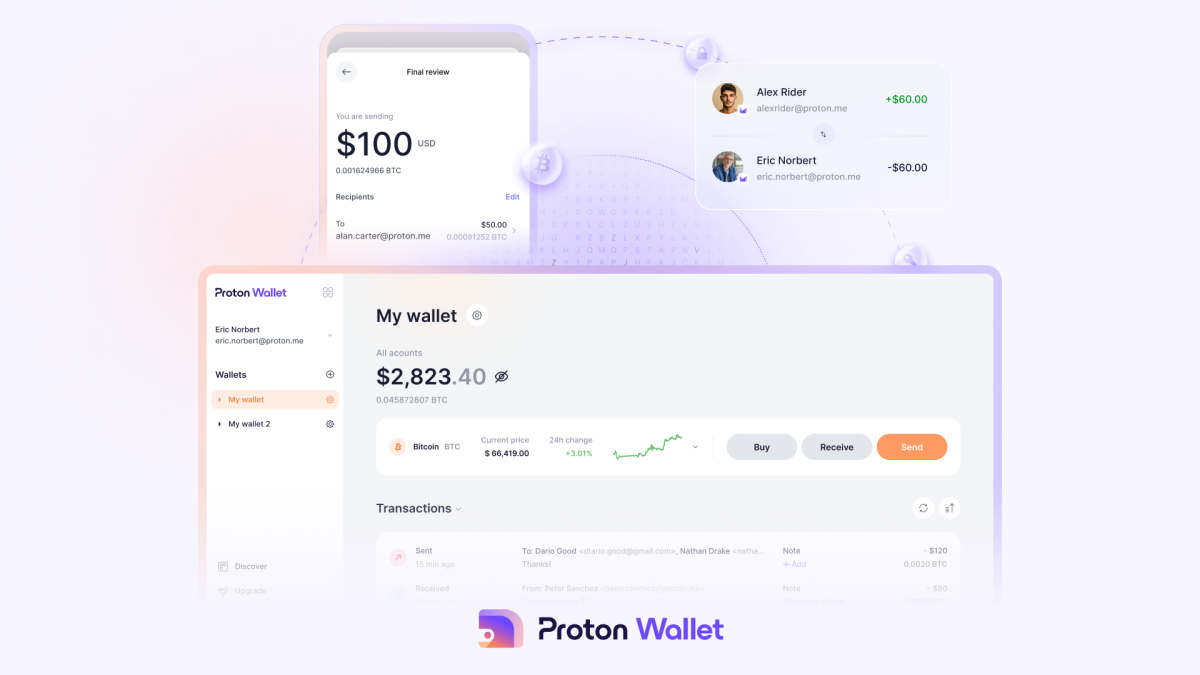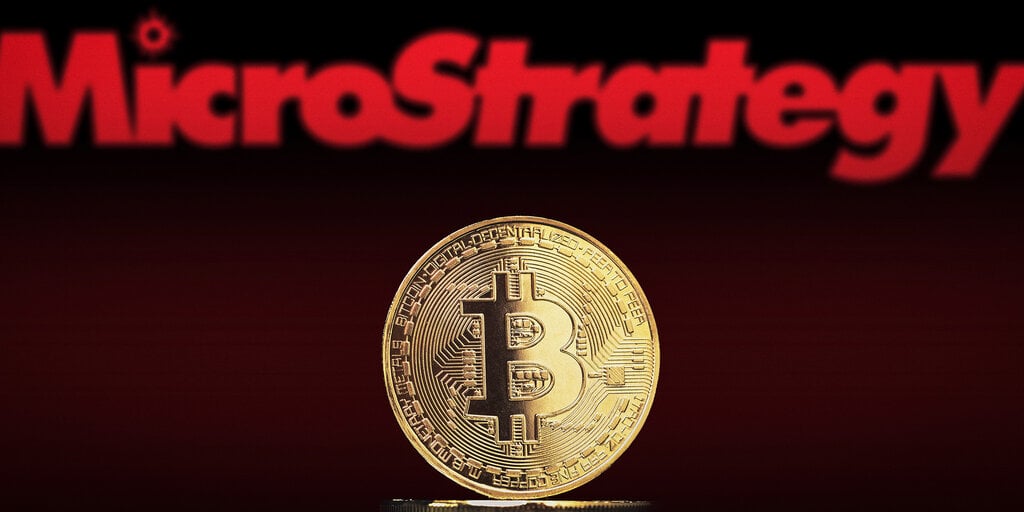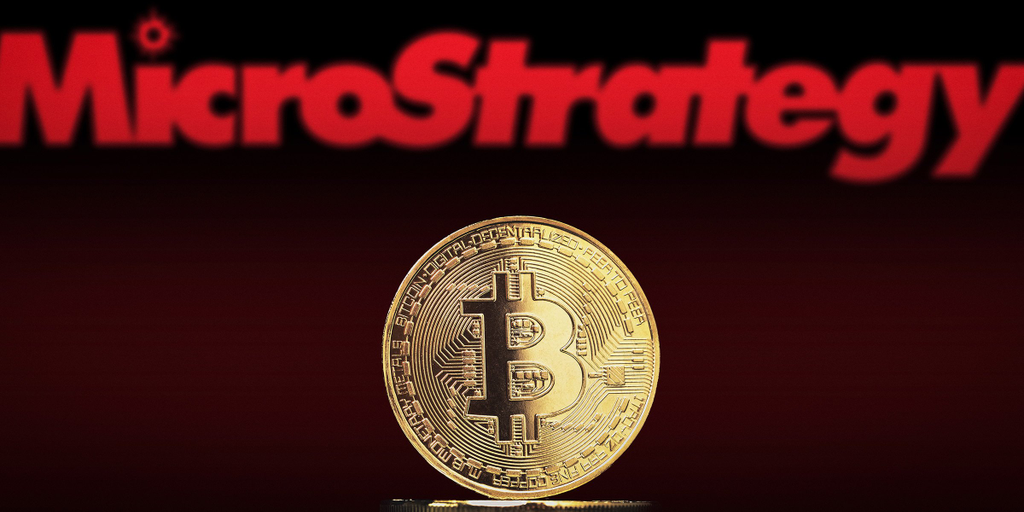business
ProtonMail Maker Proton Is Launching Its Own Bitcoin Wallet
Published
4 months agoon
By
admin

Proton, the Swiss technology company that creates privacy-preserving online tools like ProtonMail and ProtonVPN, is launching Proton Wallet, a self-custody Bitcoin wallet.
This new product will be integrated with ProtonMail and will enable users to send bitcoin as easily as sending an email.
“Bitcoin’s value to society has been hindered by the difficulty of transacting and security concerns, and we designed Proton Wallet to specifically address both,” said Andy Yen, founder and CEO of Proton in a press release shared with Bitcoin Magazine. “Proton Wallet’s ability to support Bitcoin via email now makes Bitcoin transactions as easy to use as PayPal, while preserving the decentralized and non-custodial nature of Bitcoin.”
Proton Wallet is the latest in its suite of end-to-end encrypted tools that help Proton users maintain privacy when using the internet.
Before diving into the details of this new product, it’s important to understand Proton’s motivation in creating it.
For Proton, Proton Wallet Is Personal
If it weren’t for Bitcoin, Proton might not exist.
“This summer is actually the 10 year anniversary of Proton,” Yen told Bitcoin Magazine in an interview.
“In July 2014, we had our original crowdfunding campaign, and halfway through the campaign, PayPal actually froze our funds. So, Proton actually had a near-death experience at the very beginning,” he added.
“We added a bitcoin donation link when the crowdfunding campaign got shut down, and that’s when we started receiving our first bitcoin. It was at that moment 10 years ago that we first realized the true power of Bitcoin and what it can enable.”
Yen also touched on how grateful the team Proton was that it held bitcoin when Credit Suisse, the bank it used to manage its fiat business funds, collapsed in March 2023.
“Credit Suisse had that moment of limbo where we were not sure if they were going to get bailed out or not,” recalled Yen. “The fact that we had a big portion of our reserves in bitcoin was actually something that was prudent to do because it more or less ensured the long-term sustainability of the business.”
Dingchao Lu, Director of Proton Wallet and the company’s first employee, is also grateful for the role that Bitcoin has played in the history of Proton, and he wants it to play a similar role for Proton users worldwide.
“We want to reduce the world’s dependence on centralized financial institutions,” said Lu in the press release shared with Bitcoin Magazine. “By giving users control of their own encryption keys and their own digital assets, we’re offering financial freedom, improved privacy and safety to millions of people around the world.”
Lu also shared that Proton has felt the financial benefits of holding the bitcoin it’s accepted for payments over the years.
“We’ve been taking Bitcoin payments since we launched out of beta back in 2016,” he told Bitcoin Magazine in an interview.
“That has been working well for us. The Bitcoin price has gone up something like 100 times since those early days, and we’ve held onto our Bitcoin,” he added.
The Details
Proton will leverage its existing infrastructure to make Proton Wallet more user-friendly.
To use Proton Wallet to make a bitcoin transaction via email addresses, both the sender and receiver must have the wallet. The sender need only have the recipient’s email address, whether that address is a ProtonMail address or not, to send the bitcoin. (Users can also send bitcoin from their Proton Wallet to any standard Bitcoin address.)
When sending bitcoin via email addresses, Proton will rotate Bitcoin addresses each time a user sends or receives bitcoin behind the scenes, which helps to prevent the addresses from being linked to a user’s identity.
As mentioned, Proton Wallet is non-custodial, which means that only users have access to the funds in the wallet. Proton will offer “robust recovery methods” for said keys, which will include a recovery seed phrase for the wallet as well as an Proton account recovery phrase. Bitcoin managed in Proton Wallet can be retrieved even if Proton goes offline.
Proton offers further details on its recovery and security model in this blog post.
All transactions using Proton Wallet will occur on the base chain, as Proton has not implemented Lightning yet for one main reason.
“Lightning is very difficult to do in a non-custodial way,” said Yen.
“If you want to do non-custodial lightning and you want to have people open up channels of their own, that’s a user experience that at the present moment still isn’t really solved,” he added.
“But Lightning support is something that we can add in the future as we find ways to work around the user experience problem.”
Proton will also make it easier for people to buy bitcoin, as it will provide on-ramp integrations in over 150 different countries.
What is more, Proton Wallet will also provide support for two-factor authentication, including hardware security keys, and it will offer users access to Proton Sentinel, which employs machine learning and AI to help stop malicious login attempts. Proton Sentinel helps protect users’ accounts in the event that the account has been compromised or if an attacker has obtained access to a user’s login information.
How To Get Started With Proton Wallet
Proton Wallet is currently only available to Proton Visionary users, a Proton plan normally only for legacy users but that has been re-opened for a limited time, and “select Bitcoin community members” as part of an early access program.
These participants can invite friends to join, while the product will be available to all Proton users in the future.
In the press release shared with Bitcoin Magazine, Proton also shared that it will issue a wait list for those looking to get started with Proton Wallet.
Source link
You may like


Trump Picks Pro-Crypto Hedge Fund Manager Scott Bessent for Treasury Secretary


Crypto millionaires will be made by April 2025: 6 coins to hold


Cardano Price Hits $1 But Analyst Says This Is Just The Start


Legacy Media’s Transformation: Why Evolution Beats Extinction


Massive Ethereum Buying Spree – Taker Buy Volume hits $1.683B In One Hour


Ethereum lags behind Bitcoin but is expected to reach $14K, boosting RCOF to new high
business
MicroStrategy Boosts Convertible Notes Offering to $2.6 Billion to Buy Even More Bitcoin
Published
3 days agoon
November 20, 2024By
admin

MicroStrategy’s thirst for Bitcoin cannot be quenched, despite holding over $31 billion worth.
Barely two days after announcing a plan to sell $1.75 billion worth of convertible notes as a means to buy up more of the world’s top cryptocurrency, the firm said on Wednesday that it has expanded that offering to $2.6 billion worth of notes.
Michael Saylor, MicroStrategy’s co-founder and executive chairman, said the move was made due to “high demand” for the new notes over the last 48 hours.
Given high demand, we upsized our $MSTR offering of 0% convertible bonds due 2029 from $1.75 billion to $2.6 billion, including a $400 million greenshoe option, and priced it at a 55% conversion premium.
— Michael Saylor⚡️ (@saylor) November 20, 2024
As with those initially offered on Monday, the additional zero-interest senior notes announced today will mature in 2029 and are available only to qualified institutional buyers. They will be eventually redeemable for cash, MicroStrategy stock, or a mix of both.
That’s a mighty tempting offer for many Wall Street investors, given the recent, explosive growth of MicroStrategy’s stock. The company, which owns over 331,000 BTC—1.58% of the token’s total possible supply—has seen its stock balloon by over 870% in the last year, in the wake of Bitcoin’s surge. Earlier this month, the stock reached an all-time high.
If MicroStrategy manages to raise another $2.6 billion to buy up more Bitcoin, it would be able to purchase some 27,450 BTC at current prices.
While MicroStrategy once billed itself as a business intelligence and software company, the company’s bold Bitcoin wager has upended not just its value to shareholders, but also the way it now sees itself: as the “world’s first and largest Bitcoin treasury company.”
Edited by Andrew Hayward
Daily Debrief Newsletter
Start every day with the top news stories right now, plus original features, a podcast, videos and more.
Source link
business
Marathon Digital Issues $850M Convertible Note Sale to Repurchase Debt, Acquire Bitcoin
Published
3 days agoon
November 20, 2024By
admin

Bitcoin mining company Marathon Digital Holdings (MARA) is issuing $850 million in convertible notes, with the option to expand to $1 billion, as part of plans to repurchase existing debt, acquire Bitcoin, and fund corporate initiatives amid a recovering crypto market.
The Fort Lauderdale, Florida-based firm said Monday it plans to use $199 million of the expected $833 million in net proceeds from the sale to repurchase $212 million of its existing 2026 convertible notes, according to a statement.
The remainder will be allocated to acquiring additional Bitcoin and for general corporate purposes, including working capital, strategic acquisitions, expansion of assets, and repayment of other debt, the company said.
Convertible notes are a type of debt-based financial instrument that a company sells to raise capital. The notes are typically converted into equity shares at a later date, enabling investors to hold partial ownership of the company.
Marathon’s latest offering comes as several firms globally begin acquiring and holding Bitcoin on their balance sheet following a market rally that has catapulted the price of the world’s oldest crypto to more than $94,000.
The most prominent include MicroStrategy, holding up to $30 billion in Bitcoin, and Japan’s Metaplanet, which has scooped up more than 1,000 BTC this year, worth roughly $93 million to date.
Meanwhile, Semler Scientific (SMLR) acquired nearly $18 million in bitcoin earlier this month, the company said in a statement.
Starting December 1, 2027, holders of Marathon’s convertible notes can ask the company to repurchase them for cash, though terms may change if major events like mergers, acquisitions, or delisting occur.
The notes, which mature on March 1, 2030, can also be converted into cash, MARA stock, or a mix of both, the company said.
The Bitcoin miner’s stock traded at $19.86 on Tuesday, up 9% on the day, while its after-hours price remains little changed, Google Finance data shows.
Edited by Sebastian Sinclair
Daily Debrief Newsletter
Start every day with the top news stories right now, plus original features, a podcast, videos and more.
Source link
business
Bitcoin Multisig Company Casa Makes Self-Sovereignty Easy
Published
4 days agoon
November 19, 2024By
admin

Company Name: Casa
Founders: Nick Neuman, Jameson Lopp and others
Date Founded: Late 2017
Location of Headquarters: Remote
Website: https://casa.io/
Public or Private? Private
Being self-sovereign isn’t easy — especially if you aren’t technically-minded.
The team at Casa gets this and this is why, for over six years, the company has been helping customers secure their bitcoin in multisig wallets (also referred to as multi-key vaults).
The company was the first to offer an easy-to-use version of such a product that also came with customer support. It was Casa’s plan from the onset to be there for their customers, as this type of support was lacking in the broader crypto industry.
“The service element was what was missing from a lot of solutions out there,” Casa co-founder and CEO Nick Neuman told Bitcoin Magazine.
“People need help doing this stuff, especially for large amounts of money. It was always the plan to support customers, because it was impossible to get support from exchanges or hardware wallets,” he added.
“So, we just took a very support-heavy and user experience focused approach to everything.”
Casa’s approach has paid off, as the company has become a household name in the Bitcoin and crypto space, and has come a long way since Neuman first had the idea for a company like Casa seven years ago.
How Casa Started
It was toward the latter part of the 2017 bitcoin bull run when Neuman had grown tired of his previous work in finance and tech, and found himself down the proverbial Bitcoin (and crypto) rabbit hole. By February 2018, he had an idea for a company and entered himself into a hackathon to attempt to bring the idea to life.
“I participated in the first ETHDenver hackathon,” said Neuman.
“I went in with an idea that I called key split, which was basically taking a private key using Shamir secret sharing and creating a social recovery mechanism,” he added.
“I recruited a couple of people at the hackathon to build it with me, and we ended up winning.”
Neuman quit his job and set out to start a company around this technology he and his team had created. But word had gotten out about his victory at ETHDenver, and the previous CEO of Casa, who was the head of the company before it pivoted to offering multisig wallets, reached out to Neuman, asking him to come on board.
It was after learning that Casa had just recruited Jameson Lopp, self-described “professional cypherpunk” and now Chief Security Officer at Casa, that Neuman decided to join the team.
“I was like, ‘Well, Jameson’s going to be an unfair advantage,’” recalled Neuman with a chuckle. “Instead of starting my own company, I’m going to join.”
Soon after Neuman came on board, Casa retired its then flagship product, the Casa Node, and the company shifted its focus to user-friendly multi-key vaults, a much needed product at the time. Before Casa, multisig software was so complicated that even Neuman himself struggled to use it.
“There was the Armory multisig wallet and the Glacier protocol,” recounted Neuman.
“Glacier wasn’t even software. It was like a giant GitHub repo that you had to follow in order to set up your cold storage. Armory was super janky, too. I remember trying to use it once, and I couldn’t figure it out,” he added.
“We were the first to create multisig that was usable.”
How Casa Works
Casa offers users two main set ups. The first is a five-key vault, which includes three keys on three different hardware wallets, one on the user’s phone (which is backed up securely in the cloud) and one that Casa holds.
This was Casa’s first multisig product, which it rolled out while the company primarily focused on serving customers with a high net worth in bitcoin. Casa learned an important lesson while serving these clients, which was that even if developers create easy-to-use software, people still want an expert there supporting them as they use it — especially if they’re securing a lot of value.
“When you’re dealing with millions of dollars worth of Bitcoin, you really want to have an expert there who helps make sure that you don’t make a mistake,” said Neuman.
Casa’s other main product is for those who might not be sitting on bitcoin whale-type wealth, but who still hold enough bitcoin where a less-than-ideal security setup has the potential to keep them awake at night.
This product is Casa’s three-key vault, which the company brought to market in early 2019. It includes a key on a hardware wallet, a key on the user’s phone (which can be swapped out for another key on a second hardware wallet if the user prefers) and a key that Casa holds.
Casa began offering this setup because it “always wanted to be able to offer great security and usability to as many people as possible,” according to Neuman.
New Casa Services And Features
In the past year, Casa has further broadened the services it offers.
Two weeks ago, it announced its Enterprise Plan, which enables companies to more easily secure their bitcoin treasuries.
“We’ve had businesses using Casa for self-custody for years, but they were always using our retail plans and just making it work,” explained Neuman.
“We changed that, though, because I think corporate treasuries holding bitcoin has been popularized by MicroStrategy. We actually see that as a growing trend that’s worth taking advantage of, and we’re hearing from more Bitcoin companies that are storing bitcoin on their balance sheet that they need help with security,” he added.
This summer, Casa also began enabling users to replace hardware wallets used in their vaults with YubiKeys.
“We see people struggle with hardware wallets all the time, and so we were thought ‘How can we make this simpler?’” said Neuman. “We pieced together a couple of new pieces of technology that have passkey and and YubiKey key capabilities and were able to build something that hadn’t been done before.”
And in March, Casa launched Casa Inheritance, a service that makes it easier for the loved ones of Casa users to access the bitcoin secured in the vaults in the event of a user’s death.
“With Inheritance, we heard from our customers all the time ‘Okay, I feel good about my Casa setup, but I’m worried about what happens if I die,’” explained Neuman. “So, we built that feature to make it super easy for their family to recover the bitcoin in case the main account holder dies.”
Normalizing Multisig
Despite all of the work Casa has done in the last six years, some still have an emotional block when it comes to switching to a multisig setup. Whether it’s because this type of wallet format was more difficult to enable years ago or because it’s understandably anxiety-provoking to make changes to one’s bitcoin security, people seem to drag their feet when it comes to using a multisig setup — even if they really want to — according to Neuman.
“They hear the word ‘multisig’ and they’re like, ‘That’s too hard,’” explained Neuman. “What they don’t realize is that to get started with multisig with Casa, you can use your same hardware wallet, and it is literally the same amount of effort as using a hardware wallet, but you significantly improve your security by doing it.”
Neuman thinks that more people will come around and that multisig will become more widely adopted, especially during a bull market.
“It takes the price of bitcoin going up where people suddenly have more value to secure,” said Neuman. “And it takes people hearing from their friends ‘Yeah, I’m doing multisig and it’s not as hard as it sounds.”
For those that do get the urge to try Casa, the company is allowing people to try the service at no charge for a month.
Neuman feels that as more users come on board, it will not only benefit them, but potentially the industry at large as well.
“If we can make it out of this bull market without another massive blow up like FTX because we’ve helped more people self-custody in a way that they feel good about, that feels like a real win to me.”
Source link

Trump Picks Pro-Crypto Hedge Fund Manager Scott Bessent for Treasury Secretary

Crypto millionaires will be made by April 2025: 6 coins to hold

Cardano Price Hits $1 But Analyst Says This Is Just The Start

Legacy Media’s Transformation: Why Evolution Beats Extinction

Massive Ethereum Buying Spree – Taker Buy Volume hits $1.683B In One Hour

Ethereum lags behind Bitcoin but is expected to reach $14K, boosting RCOF to new high

Bitcoin Miner MARA Buys Another 5771 BTC As Price Nears $100k

Jason "Spaceboi" Lowery's Bitcoin "Thesis" Is Incoherent Gibberish

Bankrupt Crypto Exchange FTX Set To Begin Paying Creditors and Customers in Early 2025, Says CEO

Top crypto traders’ picks for explosive growth by 2025

3 Tokens Ready to 100x After XRP ETF Gets Approval

Gary Gensler’s Departure Is No Triumph For Bitcoin

Magic Eden Token Airdrop Date Set as Pre-Market Value Hits $562 Million

Blockchain Association urges Trump to prioritize crypto during first 100 days

Pi Network Coin Price Surges As Key Deadline Nears
182267361726451435

Top Crypto News Headlines of The Week

Why Did Trump Change His Mind on Bitcoin?

New U.S. president must bring clarity to crypto regulation, analyst says

Ethereum, Solana touch key levels as Bitcoin spikes

Will XRP Price Defend $0.5 Support If SEC Decides to Appeal?

Bitcoin Open-Source Development Takes The Stage In Nashville

Bitcoin 20% Surge In 3 Weeks Teases Record-Breaking Potential

Ethereum Crash A Buying Opportunity? This Whale Thinks So

Shiba Inu Price Slips 4% as 3500% Burn Rate Surge Fails to Halt Correction

‘Hamster Kombat’ Airdrop Delayed as Pre-Market Trading for Telegram Game Expands

Washington financial watchdog warns of scam involving fake crypto ‘professors’

Citigroup Executive Steps Down To Explore Crypto
Mostbet Güvenilir Mi – Casino Bonus 2024

Bitcoin flashes indicator that often precedes higher prices: CryptoQuant
Trending

 2 months ago
2 months ago182267361726451435

 24/7 Cryptocurrency News3 months ago
24/7 Cryptocurrency News3 months agoTop Crypto News Headlines of The Week

 Donald Trump4 months ago
Donald Trump4 months agoWhy Did Trump Change His Mind on Bitcoin?

 News3 months ago
News3 months agoNew U.S. president must bring clarity to crypto regulation, analyst says

 Bitcoin4 months ago
Bitcoin4 months agoEthereum, Solana touch key levels as Bitcoin spikes

 Price analysis3 months ago
Price analysis3 months agoWill XRP Price Defend $0.5 Support If SEC Decides to Appeal?

 Opinion4 months ago
Opinion4 months agoBitcoin Open-Source Development Takes The Stage In Nashville

 Bitcoin4 months ago
Bitcoin4 months agoBitcoin 20% Surge In 3 Weeks Teases Record-Breaking Potential


